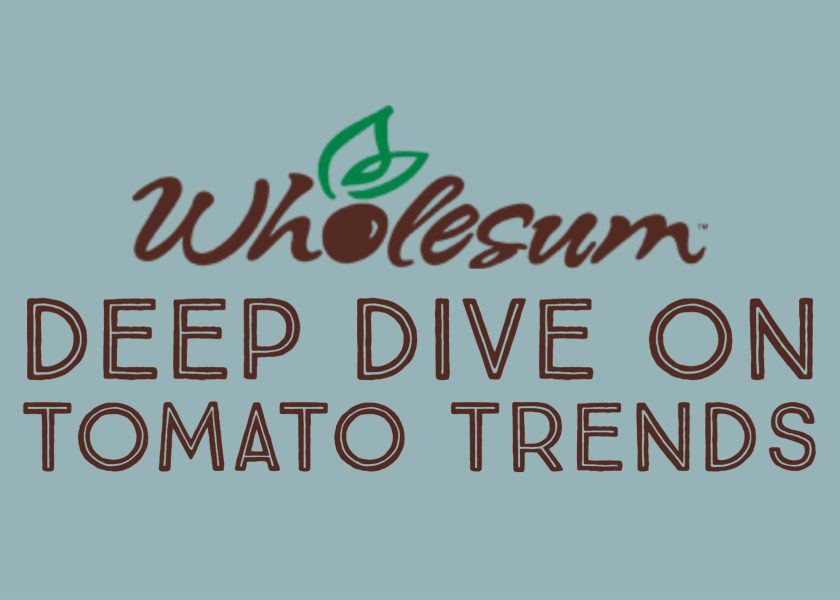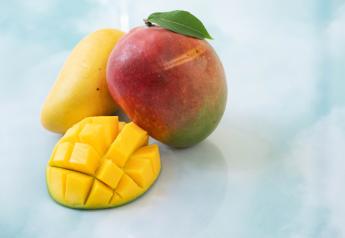Wholesum offers deep dive on tomato trends at GOPEX

An in-depth case study on organic tomatoes was presented at the Global Organic Produce Expo by Wholesum’s Joanna Jaramillo.
Jaramillo, marketing specialist for Wholesum, reviewed tomato category sales numbers and also shared results of a survey of 2,500 consumers the company collected in September.
In a review of Nielsen retail statistics for the 52 weeks ending Oct. 31 last year, conventional and organic tomato category sales, were up 15.5% in sales and 6.6% higher in volume. Total tomato sales were $4.2 billion and total volume was 1.88 billion pounds, at an average retail price of $2.22 per pound.
Organic tomatoes represented 7.3% of total tomato sales for the year ending Oct. 31, a gain of 13.4% compared with the previous year.
By volume measure, organic tomatoes accounted for 4.1% of total tomato category volume, up 11.1% compared with the previous year.
In terms of packaging, Jaramillo said 26% of conventional tomatoes were sold packaged, compared with 51% of organic tomatoes sold packaged. The higher percentage of organic tomatoes sold packaged versus bulk, compared with conventional tomatoes, isn’t too surprising, she said.
“When you start to think about it, it does make sense,” Jaramillo said. Retailers want to make sure that organic produce is entered correctly at the register, and packaging helps meet that challenge.
By tomato type, snacking tomatoes accounted for 40% of total organic sales, followed by 35% for tomatoes on the vine, 9% for heirloom and 6% for roma.
By way of contrast, conventional tomato sales by type were 42% tomatoes-on-the-vine, 26% snacking tomatoes and 21% roma.
Snacking tomatoes are tops among organic varieties in driving sales and volume, she said.
Jaramillo said that heirloom organic tomatoes, at 9%% of organic tomato sales, significantly outperform conventional heirloom tomatoes, which rate just 1% of conventional tomato sales.
“Even even though (organic heirloom tomatoes) are not widely available, when they are, they perform pretty well,” she said.
On other hand, organic roma tomato sales (6% of organic tomato sales) underperform compared with conventional roma sales (21% of conventional tomato sales).
Consumer insights
In the consumer survey by Wholesum, Jaramillo said flavor, quality and health benefits were identified as key purchases drivers for organic tomatoes.
“(The survey) really reinforces the idea of having those high flavor varieties and specialty items in the organic selection,” she said. “Consumers need to have that those options available for them because it’s what they’re looking for.”
When consumers were asked what factors are most important to them when selecting organic tomatoes, flavor, quality and health benefits were most mentioned. The results were:
- Flavor 80%;
- Quality/appearance: 79%
- Health benefits: 78%
- Grown in the U.S.: 69%;
- Locally grown: 61%;
- Price value: 60%;
- Sustainable farming: 56%;
- Eco-friendly packaging: 47%;
- History of growing tomatoes: 39%; and
- Brand: 24%.
When consumers were asked the reasons they bought, or would buy, organic tomatoes instead of non-organic tomatoes, the survey found these reasons were listed:
- Fewer chemicals: 72%;
- Better flavor: 52%;
- Better quality: 51%;
- Better for environment: 44%
- More vitamins: 40%;
- Price similar to non-organic: 31%;
- Prefer for children: 20%;
- No conventional available: 9%; and
- Other: 1%;
Jaramillo said 83% of consumers rated organic tomatoes as significantly or somewhat better quality than non-organic tomatoes. Six out of ten consumers say they buy organic tomatoes, she said.
Some barriers to organic tomato purchases, according to the survey, were;
- Not available; 57%;
- Too expensive: 50%;
- Non-organic on sale: 30%;
- Variety/type not available in organic: 18%;
- Organic not very important: 8%
- Only for children: 5%;
- Other: 2%; and
- No particular reason: 8%;
The survey found that 50% of consumers prefer loose tomatoes, 21% like packaged tomatoes and 29% don’t care.
According to the Wholesum survey, the top reason why consumers prefer loose tomatoes is to select the produce themselves (79%); and 40% also said because it’s better for the environment.
The top reason why consumers prefer packaging is because it protects the tomatoes (54%), according to the survey.
The survey also found that 63% of consumers said they are willing to pay more for sustainable packaging, with the majority saying they would pay slightly more and 16% saying it didn’t matter how much more.
The survey found that 87% of consumers usually or sometimes look at packaging or signage, and the top element consumers look for is the certified organic seal, followed by origin (U.S. grown), non-GMO, natural, sustainably grown, recycled packaging, Fair Trade and gluten-free were mentioned by some consumers.
Jaramillo said the key points about organic tomatoes are:
- Conventional tomato market statistics are not always the best indicator for how organic varieties are performing;
- Availability, quality and flavor are top drivers to grow the category;
- Pricing is still a barrier to organic tomato purchases; retailers should be aware of the opportunities for trading up; and
- Don’t underestimate the role of messaging on signage, merchandising and packaging.
Related articles:
Trends still pointing up for organics
Home gardeners test tomato varieties for University of Florida
Early tomato market for West Mexico shows strong prices







